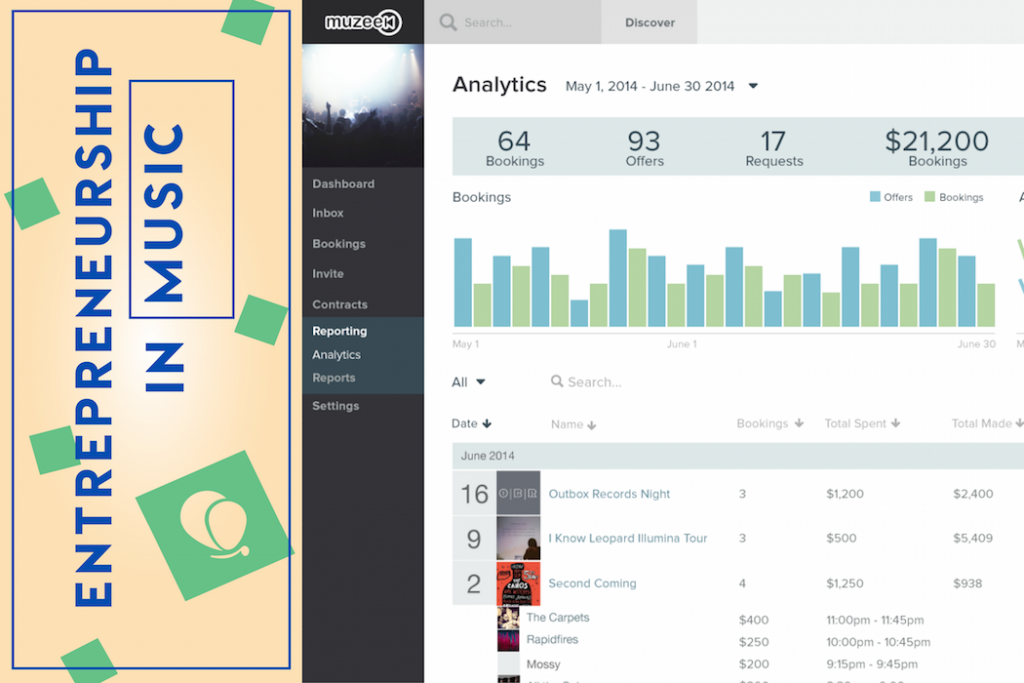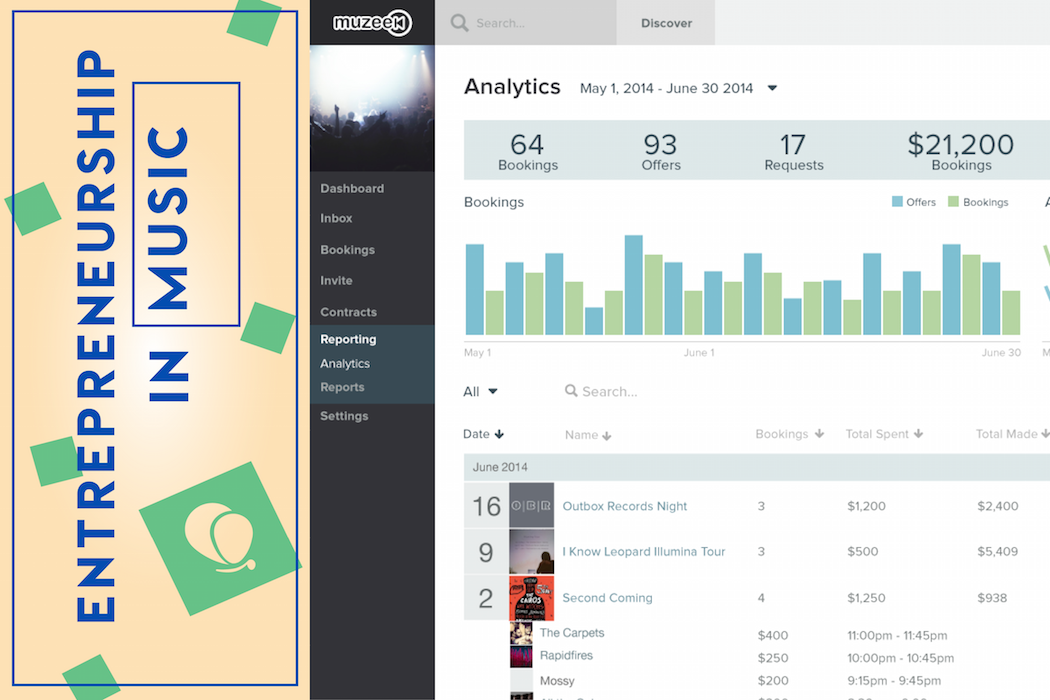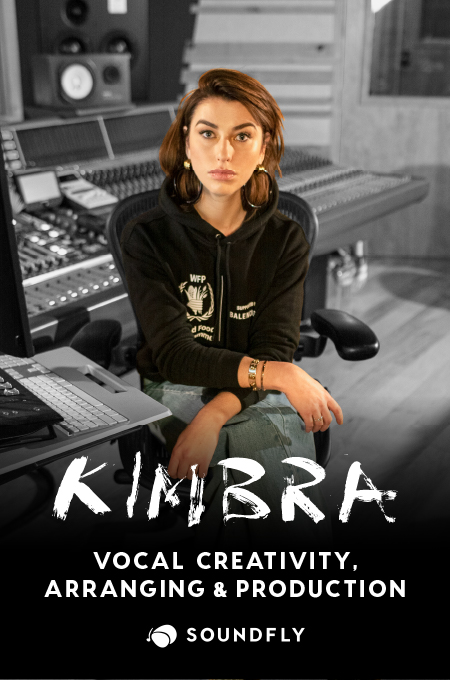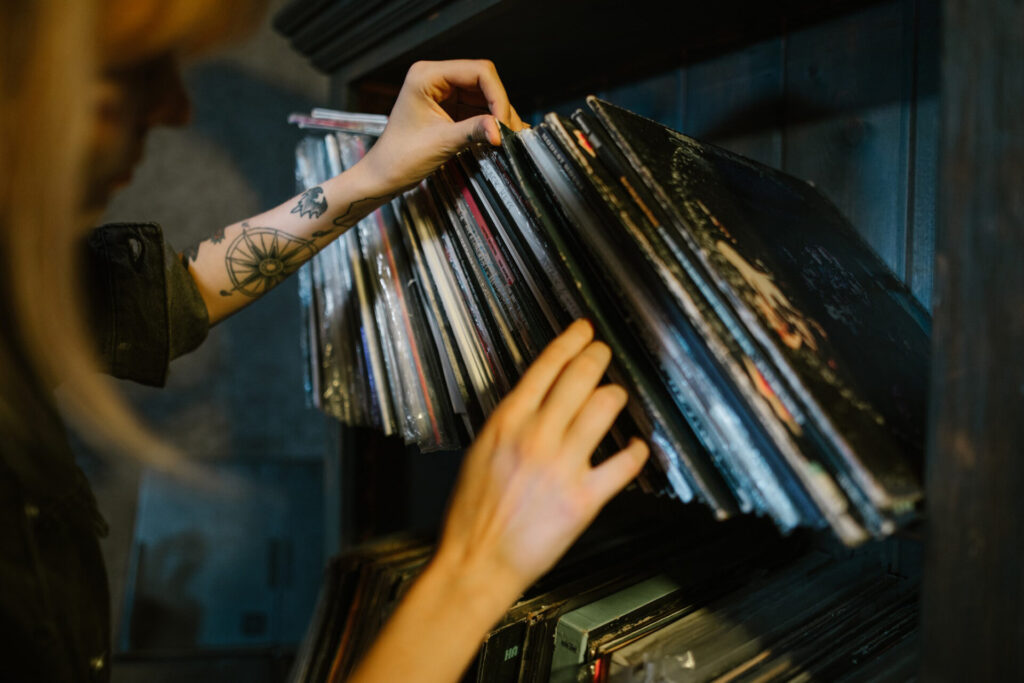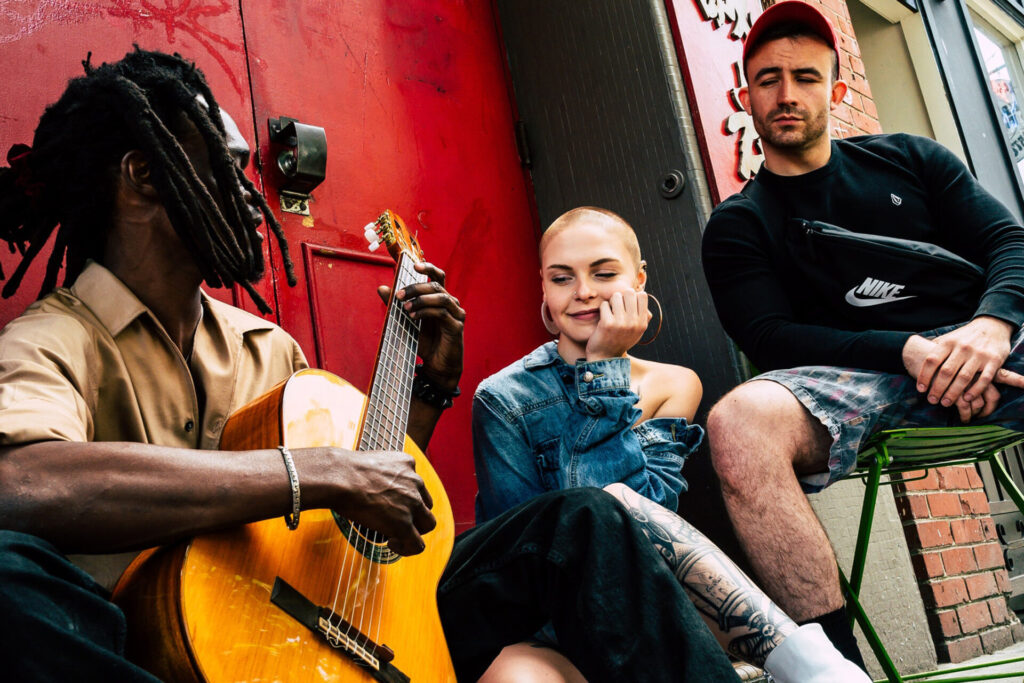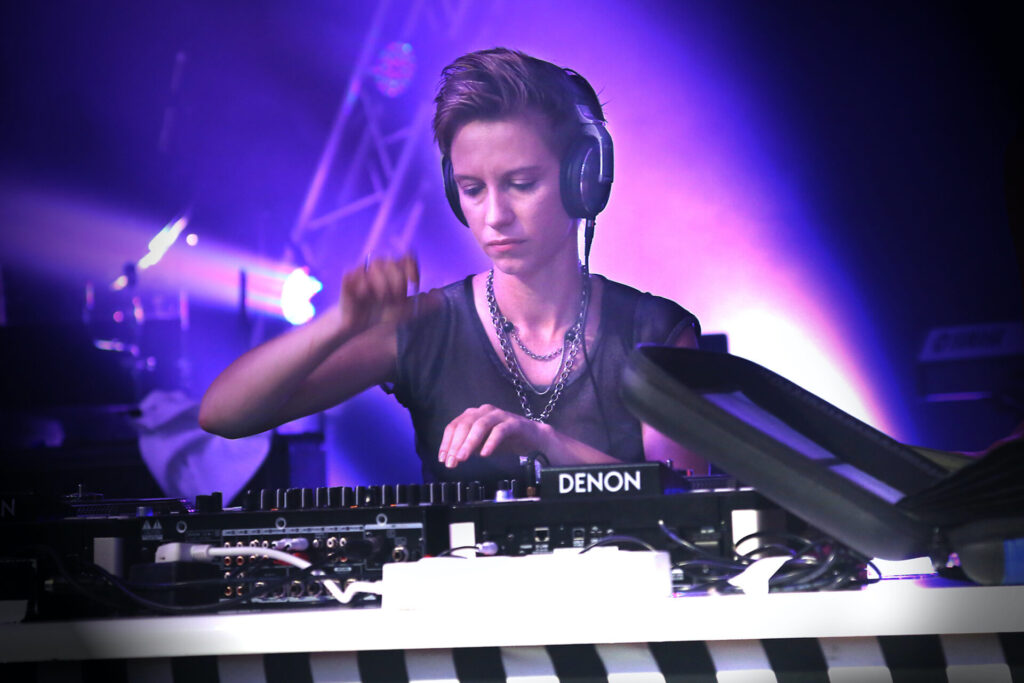Entrepreneurship in Music Series: 005
MUZEEK
Co-Founder/Managing Director, Danny Fiorentini
Sometimes the only difference between a locally-unknown band and a nationally-recognized band is the quality of shows they’re playing. Streamlining and professionalizing the booking process, and being wholly available to live opportunities is just the beginning. Building a better band also means understanding what money is coming in from every show, managing that money effectively and having the wherewithal to negotiate reasonable fees. This Sydney-based startup is trying to make this aspect of band management universal.
Muzeek was dreamt up by Danny Fiorentini (DIY experience, flies by the seat of his pants), Dave Robledo (professional booker, used to being the head honcho around local music venues) and a handful of other disgruntled indie music personalities around Sydney, over some pretty epic pizzas and beers, as a way of solving how utterly bothersome the live-music booking process can be. Fast forward a couple years, and they’ve created a beautiful, streamlined software-as-service platform for artists, venues, bookers, promoters and managers alike, designed to make live-event booking easier and automated. Muzeek is the product they’ve always wished they could build, and they are having the time of their lives building it.
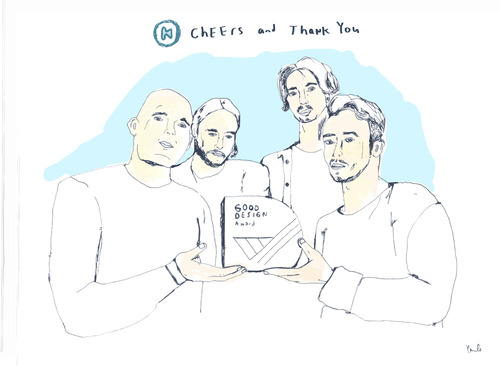
Early adopters that have championed Muzeek: VICE/NOISEY Australia, venues and booking agencies across Australia as well as in the Northeast US, and live music related tech services, Bandsintown & atVenu.
How did you all meet?
Dave and I had met through mutual friends when I moved to Sydney, and I basically slept on his couch for a couple of months before moving into my new apartment. It was during this time that we realized we shared a similar problem with the live-music industry, Dave on the venue operations side and myself on the label/agency side. Coincidentally, that same week, I stormed into the VICE Australia offices and demanded a job that they didn’t have. Luckily they were cool enough to let me cruise on an empty desk and help out as an intern. I sat next to Todd, who was not only a great UX designer but also in a bunch of bands — so he felt the pain from an artist’s perspective. We then met Roel, a full-stack developer, who’s been to more shows than Dave, myself and Todd have put on, combined — very serendipitous! We then added much smarter people around all of us collectively, to make sure we were doing the right things. Our “About” page has a pretty funny rendition of how it all went down.
What is the essential problem that you have set out to solve?
Basically the entire live-music industry is incredibly inefficient — and it has everything to do with the manual processes themselves. Whereas the distribution side of music has evolved 10-fold, live music’s processes are archaic, costly and fragmented. Almost nothing is automated or easy. Muzeek’s software provides automated solutions to traditionally tedious tasks — such as contracts, worksheets, holds, deal terms, etc. As bookings and event transactions take place, this “source data” is much more easily distributed across channels automatically with APIs, removing the need to manually log-in to a million things after shows are locked in and retype everything you just did for weeks. We’re here to streamline the live music industry’s processes, from start-to-finish, for venues, artists, promoters, agencies, managers, festivals, management companies, venue groups, labels, and even brands.
Whereas the distribution side of music has evolved 10-fold, live music’s processes are archaic, costly and fragmented. Almost nothing is automated or easy.
Your slogan is quite funny, “Love booking again.” It made me chuckle a bit, since it’s pretty well known how annoying and pesky talent buyers can be for artists, and of course vice-versa, it’s a communication war out there, and sometimes it feels like everyone’s losing. Just curious, what inspired that tagline?
Ha, yeah, from double bookings, to lost invoices, to inaccurate ticket counts, we’ve seen it all. But in general, everyone we know or come across in the industry is just bogged down with time inefficiencies, which induces unnecessary stress. We’re talking a standard of 9-10 hour days of overflowing email and invoices. Music industry booking processes, as a whole, from top-to-bottom, are a combination of relationship building and mind-numbing, manual data-entry. So although everyone in the industry loves music and the people they associate with, “booking” itself is super cumbersome. There are just not enough hours in the day and yet tons of room for technological improvement. As you said, it’s really a communication war, combined with wishing there was technology to automate half the things everyone does.
Honestly, the quote was just an inspiration from our customers’ feedback. During some of our early meetings, feedback ranged from “holy crap how has this not existed before?!” to “I’m literally having fun while booking now.” So we decided that, in general, the music industry would collectively “love booking again” with our software. It’s certainly one of our goals as a company. We just want to make everyone’s booking life a bit easier.
Can you talk a bit about winning the Good Design Award?
That was pretty cool. Being associated with brands like Range Rover and MailChimp just months after being online was definitely a confidence booster. It was even more validating when the judges explained how they saw our industry “vision” of what we were doing with the technology, not just how it looked. I’ll never forget that night; we literally had $150 in our account and the Uber ride to the event itself was $120 and we technically couldn’t afford to get home after receiving our award! There we were, walking around the place with all these successful people in suits patting us on the back, but internally we were saying “well fuck, I’m not sure how we’re getting home, but thanks!” I think we devoured every free drink and sandwich in that place!
It’s like that classic artist “schizo-paranoia” scenario — as soon as we’re done with a thing, we instantly hate it and need to make it better before anyone listens.
As an artist, I am not totally sure how to use this product. Is it useful for my band to have a Muzeek profile if the venues I’m trying to book are not using this service?
Yes, definitely. We understand that not everyone will be on the service all at once, so the software was designed as a “me-first” platform and accomplishes two things simultaneously:
1.) Streamline processes internally for teams (promotion, communication, centralizing tasks, etc.)
2.) Streamline processes externally between teams (sending booking confirmations, payments, holds, etc.)
So for instance, although some venues may not be on Muzeek, the platform itself is designed to be your central “hub” internally as a band, including sending those “non-users” booking confirmations and contracts/riders through the platform. You’ll only need to enter in your Contract details once, and each time you confirm a show with an external venue (perhaps through traditional communication methods), you can send them a confirmation from within Muzeek, which will automatically populate your contracts with their info. Muzeek then assembles all of your public information for promoting the show outwards to your websites and social media when it’s announced — so you don’t have to log-in to a bunch of stuff afterwards and retype it all. Additionally, other band members are notified all in the one spot, everything is tracked and organized. The value is then added when other users are on it, too.
How did the networks and contacts you developed in the music industry help to kickstart this venture?
Obviously the “idea” of live music websites, of some sort, has floated around for about a decade. But to be honest, I think the evolution of the Internet itself enables Muzeek to exist now. It’s really the right time for it, so to speak — there’s just so much more you can do with code now. So, kickstarting the venture was an amalgamation of using older websites that didn’t solve my own problems, while also continuously hearing the same issues from my network of friends within the industry. It’s been absolutely amazing getting feedback from our network. It’s great to just shoot over a new idea or feature and discuss it, or get early adopter usage from those who know this is a work-in-progress. Since members of our team book shows regularly, we have tons of daily user-case scenarios whereby we find things we hate, love, or need to adjust.
It’s like that classic artist “schizo-paranoia” scenario — as soon as we’re done with a thing, we instantly hate it and need to make it better before anyone listens. Needless to say, it’d be impossible to develop Muzeek without the experience of our team and the help of our early adopter “feedback network” within the industry. You can’t build this thing from the “outside-in.” It needs to be built by the live industry itself — from the inside-out. Our network and contacts’ feedback has undoubtedly contributed to most of our work. It’s an ongoing development project — we push updates pretty much daily.
The lingering misconception is that bands “need” a pile of money or a management team — but in reality, it’s just being a scrappy team of people using technology. If you have a band of 5 members, you now have a “label” with 5 employees.
Are you looking to break into the US/Canada market nowadays?
Yeah. Continuing from the “network” question above, it’s only with passionate usage, customer recommendations, and approval that it’ll expand as it should. So “breaking” into any market will come with active usage from a few of our key accounts in a couple of markets. Australia does things differently to the U.S., which does things differently to Europe and Canada. So the trick was to ensure how what we were building accounted for unique regions. We consider ourselves a “global” platform by default (with just language barriers), that will break into markets through usage. As artists and venues send new people confirmations, hold notifications, contracts, etc., we’re able to onboard those seeing it for the first time pretty easily, and they repeat the process. We just have to provide the best technology that they really love.
Can you talk a bit about the move to Baremetrics, and joining the “Open Startups” Movement?
When you boil it down, we’re here to help the music industry. Period. So it makes sense that we are transparent about our business and making sure we’re held accountable for our product. In an industry wrought with missing money and contract feuds, I figure the least we could do is be super open about what we’re building. Josh and the Baremetrics team are inspiring to me personally — they deserve a lot of credit for what they do for startups! The Open Startups movement is really about helping and contributing value to different types of industries. We want to help and contribute to the music industry — for what it’s worth, I think this adds some value to those curious about our status, growth and potentially, even our mistakes.
Education about anything is virtually free these days. All you need is a combination of technology and an eagerness to learn to run that technology.
Why did you choose the logo graphic to be a “track back” button?
That was sort of an accident? It was originally the ending “k” in our “Muzeek” logo. When we originally had the logo designed, we thought “hey, that sort of looks like a ‘back’ button too!” … and thought we were hella smart. Then after a year or so we started hating our logo again and just wanted to use the minimalistic “track back” button (we call it the “stamp”) just so we didn’t have to look at the logo anymore. It started occurring to us that the “track back” connotation would be attached to our symbol, so now we’re going with a simple text logo. Hey, speaking of which! We just updated the site to include the new one. Check it out.
What would be your advice for aspiring musicians these days?
Honestly, having been on both sides of the coin as an artist, and then a manager yelling at artists — my biggest piece of advice is: listen, learn, and be lean. Run your operation like a start-up and execute yourself, first. Don’t expect anyone else to do anything for you. I think the lingering misconception is that bands “need” a pile of money or a management team — but in reality, it’s just being a scrappy team of people using technology. If you have a band of 5 members, you now have a “label” with 5 employees. Each contribute $100 a month to start and you suddenly have $500 recurring expenses for growth and technology, paid for. Who can learn to code a website? Who can design a logo? Who runs your SoundCloud or TuneCore accounts? Who’s the publicist? Who runs your Muzeek account? (Ha!) An infinite number of tools are at your disposal right now.
Education about anything is virtually free these days. All you need is a combination of technology and an eagerness to learn to run that technology. Find and use the tools that will help you run like an independent, well-oiled machine. And I’m saying this as an indie-label owner! I like to think of it as — you’re the “CEO” of your music persona. If your band name is New Dads (freebie), then you’re the CEO of New Dads. Everyone has a role. What does that $500 a month get allocated for? Get to work!
Click here for the full Entrepreneurship in Music series!
Ready to take your band to the next level? Sign up for our free band management course, Building a Better Band today!
